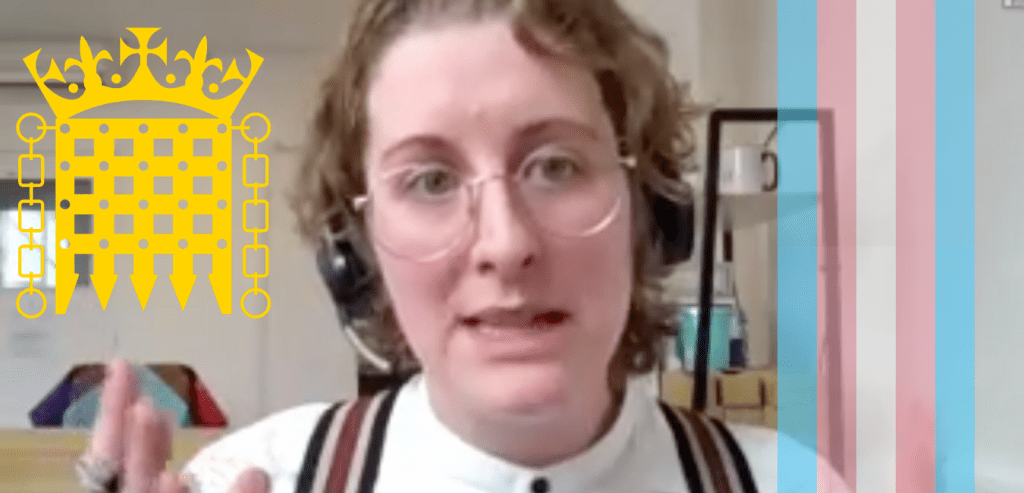
Today was an important day, as MPs in Parliament continue to search for the facts around trans lives, amidst ongoing misinformation and discrimination in society, in the media and – in some quarters – at Westminster. Primarily, the Women and Equalities Select Committee was gathering evidence around reform of the Gender Recognition Act. Lui Asquith, (they/them) Mermaids Director of Legal and Policy, gave evidence to the committee, representing trans children, young people and families. The two-hour session covered a wide range of issues related to gender identity, many of which have no connection to the Act itself. However, we’re pleased to have been invited to give evidence, in the hope that transgender, including non-binary and gender diverse young people will one day be offered true equality in law.
Lui began by telling the committee that trans young people are being subjected to discrimination because the State isn’t offering them the dignity and respect they deserve to be acknowledged in law.
Asked whether the requirement of a diagnosis of gender dysphoria be removed, Lui said: ‘We need to move away from pathologising trans young people, and we need to be very alive to the fact that the current system of legal gender recognition requires individuals to be experiencing immense and persistent distress because of their gender incongruence, to experience anxiety around their gender identity for their gender to be legally recognised. Not everyone experiences such distress, and therefore such a process acts to exclude.’
On a question around the importance of improving access to gender recognition, Lui explained that trans young people need to be seen, listened to and respected at all levels of society!
A question was asked about whether ‘detransitioning’ should justify preventing under 18s from accessing legal gender recognition. Lui explained why society has a responsibility to empower, not punish, people of all gender experiences, including those who follow a ‘non-linear’ path.
Lui spoke passionately about the way many young trans people feel afraid of being ‘outed’ at school and shared accounts of young people risking their health because they’re afraid to use toilets.
Asked whether the requirements for a person to live in their chosen gender for two years be removed and why, Lui siad: ‘If we really think about the ‘real life experience’ test, we realise that people are being asked to evidence their gender. How does one even do that, what does evidence look like. If the same question was asked of cis people, could one do so without relying on outdated gender stereotypes.’
Lui was asked what issues there are around an anonymous panel making decisions about granting trans people their gender recognition certificates.
Lui asked the committee to speak directly to trans and gender-diverse young people and explained that most young people do not take a medical route when they access healthcare.
The committee questioned why a growing number of children and young people, assigned female at birth, are being referred to the Gender Identity Development Service.
Lui spoke about the importance for government, charities and society in general to work harder to listen to and empower trans people of colour.
We’re about to launch our new project, Mermaids Sport: Active About Inclusion, and Lui made sure to represent the need for trans young people and children to be included in sporting activities, free from discrimination.
Thank you Lui, for speaking up for trans young people, and representing the discrimination faced in everyday life, as well as the hurdles created for all trans people by the current Gender recognition Act.
As Lui said: ‘We need to consider reality – we shouldn’t let the fear of something for which there is no evidential basis stop progress.’
